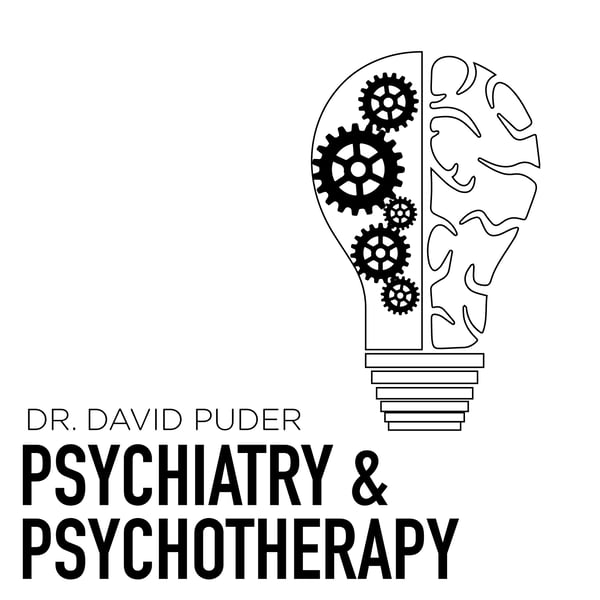“Serotonin Toxicity”, Otherwise known as Serotonin Syndrome
Psychiatry & Psychotherapy Podcast
David J Puder
4.8 • 1.3K Ratings
🗓️ 5 April 2023
⏱️ 80 minutes
🧾️ Download transcript
Summary
In today’s episode of the podcast, we are joined by psychiatrist and neuropharmacologist Dr. Ken Gillman who is the founder and convener of the International MAOI (monoamine oxidase inhibitor) Expert Group and widely recognized as a world expert in serotonin toxicity.
Serotonin toxicity (syndrome) is a rare as well as potentially lethal form of toxicity that results from excess serotonin within neuronal synapses. There are numerous poorly written/controlled case reports that have perpetuated misinformation about drugs that can cause serotonin toxicity. While the word “syndrome” is often used, toxicity is a more accurate description given that toxicity represents a spectrum of severity rather than a defined set of symptoms. In today’s podcast, we will discuss the pathophysiology, causes, clinical presentation, criteria, controversies, and medical management of serotonin toxicity.
Full blog here.
Transcript
Click on a timestamp to play from that location
| 0:00.0 | All right, welcome back to the podcast. I am joined today by Dr. Alexander Horowitz. He is a PGUI-3 at Community Memorial Health System in California. |
| 0:25.0 | And he was so kind to connect me with Dr. Ken Gilman who is out in Australia. He is the director of the Psychotropical Research Group and the presiding Council Chairman at the International MAOI Expert Group. |
| 0:41.0 | He is an expert in serotonin syndrome or what he will call serotonin toxicity. |
| 0:49.0 | So today we are going to be doing a deep dive on serotonin toxicity. Let's see, I have no conflicts of interest. |
| 0:57.0 | Alexander Horowitz has no conflicts of interest. Dr. Gilman was telling me he has $100 stake in neuro-well therapeutics, a company that has a patent for an MAOI, which we will be covering a little bit about MAOIs, but we won't be specifically talking about this. |
| 1:16.0 | So I think that's not a huge conflict for this episode. Yeah, why don't we start with Alex? Tell me a little bit about how you got connected with Ken Gilman and this topic and why you thought it was interesting to bring here. |
| 1:32.0 | Yeah, sure, definitely. So during my intern year I was on internal medicine and I had a case of serotonin toxicity and a professor actually recommended contacting Dr. Gilman because he is the world expert in serotonin toxicity. |
| 1:48.0 | And that's how I came to come in contact with him. I actually had a patient who was taking an MAOI and had overdosed. |
| 1:57.0 | And this topic just comes up again over and over in my clinical experience. And I think that there's just a lot of misperceptions out there about certain medications that can cause serotonin toxicity. |
| 2:11.0 | Yeah, so Dr. Gilman, do you want to give us like a brief introduction on what is serotonin toxicity? |
| 2:20.0 | Yes, certainly. It's an intra-synaptic concentration dependent phenomena involving serotonin, of course, hence its name. |
| 2:32.0 | And it's caused by drugs that elevate serotonin levels way beyond what is physiologically usual or normal. |
| 2:43.0 | It has very characteristic symptoms and when it occurs in its serious form, which is really only when two different sorts of drugs with different mechanisms of action, I mean, by different sorts of drugs. |
| 3:02.0 | When two different mechanisms are used at the same time, that can elevate intra-synaptic serotonin to a far greater degree than would ever occur with a single drug or under normal physiologically conditions. |
| 3:16.0 | So that's why we started to try to teach people to call it toxicity rather than serotonin syndrome going way, way back when I was involved with Professor White, who's a famous professor of clinical pharmacology and toxicology. |
| 3:34.0 | And we thought there was such a muddle because well, first of all, if you want to use terminology precisely, it's not a syndrome, it's a form of drug toxicity. |
| 3:47.0 | If somebody was intoxicated with lithium, you wouldn't call it lithium syndrome, you'd call it lithium toxicity. |
| 3:57.0 | And obviously we use the word toxicity because that's usually meant to imply a condition of a severity that's potentially fatal. |
| 4:09.0 | So is it like on this more severe realm? Is it fatal? |
| 4:16.0 | Most certainly, yes, it's about the only, possibly the only, I think Alex, you're probably more up to date with this. |
| 4:24.0 | I can't think of any other drug interaction that would occur in psychiatry, possibly even in general medicine, that potentially kills people within 24 hours. |
| 4:36.0 | There aren't many other. |
... |
Please login to see the full transcript.
Disclaimer: The podcast and artwork embedded on this page are from David J Puder, and are the property of its owner and not affiliated with or endorsed by Tapesearch.
Generated transcripts are the property of David J Puder and are distributed freely under the Fair Use doctrine. Transcripts generated by Tapesearch are not guaranteed to be accurate.
Copyright © Tapesearch 2025.

